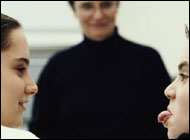Most US Medical Students Experience Harassment Or Belittlement
Experiences of belittlement and harassment and their correlates among medical students in the United States: longitudinal survey BMJ Online First
Most medical students in the United States report having been harassed or belittled during their training, reveals a study published on bmj.com today.
A total of 2884 students from 16 nationally representative US medical schools were sent questionnaires at three key points during their training (at freshman orientation, entry to wards, and senior year).
In the second and third questionnaires, students were asked about whether they had been harassed or belittled by other students, by residents or fellows, by preclinical professors, by clinical professors or supervisors (attendings), or by patients.
Just over 80% of students responded. At entry into wards, 8% of medical students reported having been harassed by residents or fellows, 8% by clinical professors or attendings, and 10% by patients compared with 27%, 21%, and 25% of students in their senior year. 
At entry to wards, 28% of students reported having been belittled by residents or fellows, 32% by clinical professors or attendings, and 22% by patients compared with 71%, 63%, and 43% of students in their senior year.
Overall 42% of senior students reported having ever been harassed by other students, residents or fellows, preclinical professors, clinical professors or attendings, or patients, 84% indicated ever having been belittled, and 40% had experienced both.
Only 13% of students classified any of these experiences as severe.
Students who reported having been harassed or belittled did not differ significantly by sex, ethnicity, political orientation, or religion compared to those not reporting such experiences. However, they did differ by chosen specialty and were significantly more likely to be stressed, depressed and suicidal, to drink alcohol or to binge drink, and to state that their faculty did not care about medical students.
They were also significantly less likely to be glad they trained as a doctor.
These results clearly show that levels of belittlement and harassment are high among medical students in the United States, say the authors. Some of these experiences were caused by other students and preclinical professors, but most commonly by residents, clinical professors, and patients.
The medical profession needs to model ethically appropriate and sensitive behaviour if students are to learn to behave ethically with colleagues and patients, they conclude.
Source: British Medical Journal
Revision date: July 8, 2011
Last revised: by Andrew G. Epstein, M.D.